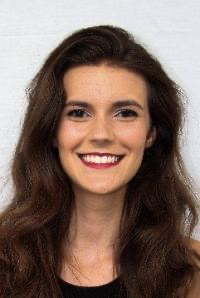 Why I chose Pitt: My interview experience at Pitt was unique in that I immediately felt like I fit with the current students and faculty. The students were welcoming, passionate, and seemed to be each other's biggest supporters, which was something that I was looking for in my graduate school environment. I had great conversations with the faculty and genetic counselors throughout my interview day, and could tell how student-centered the program was. In addition, during my two gap years I worked with a genetic counselor who was an alumna of the Pitt program, and she had nothing but positive things to say about her experience. These factors, along with the fact that the program is housed in the school of Public Health, made Pitt stand out to me as I was considering my rankings. Though it's not completely tangible, the fact that I felt connected to the students and faculty after just one day on campus at Pitt was what completely sealed the deal for me!
Why I chose Pitt: My interview experience at Pitt was unique in that I immediately felt like I fit with the current students and faculty. The students were welcoming, passionate, and seemed to be each other's biggest supporters, which was something that I was looking for in my graduate school environment. I had great conversations with the faculty and genetic counselors throughout my interview day, and could tell how student-centered the program was. In addition, during my two gap years I worked with a genetic counselor who was an alumna of the Pitt program, and she had nothing but positive things to say about her experience. These factors, along with the fact that the program is housed in the school of Public Health, made Pitt stand out to me as I was considering my rankings. Though it's not completely tangible, the fact that I felt connected to the students and faculty after just one day on campus at Pitt was what completely sealed the deal for me!
Background: Research assistant at the Lombardi Cancer Center (Georgetown University); Crisis Text Line volunteer (Online); teaching assistant (Georgetown University); peer mentor (College of Wooster); student health center peer educator (College of Wooster); vice president of the Psychology Club (College of Wooster); research assistant at the Ophthalmology Genetic Counseling Clinic (University of Michigan); genetic counseling shadow through the University of Michigan and Georgetown University
Work Position: Genetic counselor assistant at Magee-Womens Hospital
Savannah Binion (BA in psychology, College of Wooster, 2018)
 Why I chose Pitt: I chose Pitt for my genetic counseling education for several reasons. I was drawn to the school’s unique emphasis on genetics in public health. I also appreciated the overall structure of the program that allows for most courses to be completed in the first year so students are fully prepared to take part in clinical rotations. After visiting Pittsburgh I quickly realized I wanted to be a part of this passionate, dedicated group of people. Even though we are only a few weeks into classes, I already feel the support of this close-knit genetics community.
Why I chose Pitt: I chose Pitt for my genetic counseling education for several reasons. I was drawn to the school’s unique emphasis on genetics in public health. I also appreciated the overall structure of the program that allows for most courses to be completed in the first year so students are fully prepared to take part in clinical rotations. After visiting Pittsburgh I quickly realized I wanted to be a part of this passionate, dedicated group of people. Even though we are only a few weeks into classes, I already feel the support of this close-knit genetics community.
Background: Genetic counseling assistant (GeneDx); volunteer genetic counseling assistant (Advocate Lutheran General Hospital); crisis intervention hotline volunteer (Crisis Center of Johnson County); online support group administrator, Make-A-Wish volunteer (Northern Illinois)
Elizabeth Bombal (BS in biology, genetics and biotechnology track, minors in psychology and informatics, University of Iowa, 2017)
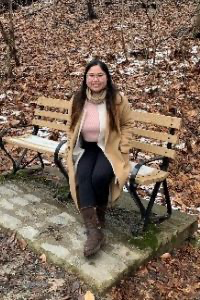 Why I chose Pitt: I applied to Pitt because of the program’s established history, its integration of public health into the GC program curriculum, and engaging activities written by students on the program’s blog. Before the pandemic, I was very lucky to get to do an in-person interview at Pitt, where I enjoyed it very much and learned that the program has much more to offer: compassionate and dedicated program leaders, the amazing alumni network, and diversity in clinical rotations in a prominent health care system. Passionate about improving Viet genetic health with cultural competency, I strongly believed that Pitt GC program’s public health approach would equip me with powerful tools to make a difference in my community. Furthermore, living in Pittsburgh is a cherry on the top. The city is peaceful, affordable, and diverse with a unique vintage charm.
Why I chose Pitt: I applied to Pitt because of the program’s established history, its integration of public health into the GC program curriculum, and engaging activities written by students on the program’s blog. Before the pandemic, I was very lucky to get to do an in-person interview at Pitt, where I enjoyed it very much and learned that the program has much more to offer: compassionate and dedicated program leaders, the amazing alumni network, and diversity in clinical rotations in a prominent health care system. Passionate about improving Viet genetic health with cultural competency, I strongly believed that Pitt GC program’s public health approach would equip me with powerful tools to make a difference in my community. Furthermore, living in Pittsburgh is a cherry on the top. The city is peaceful, affordable, and diverse with a unique vintage charm.
Background: Volunteer at Trauma Intervention Program (Orange County, CA); volunteer and GC shadow at Cancer Genetics Center (St Joseph’s Hospital); STEM and psychology tutor (C2 Education); Newhope crisis hotline counselor (Orange, CA); genetic counseling shadow intern (Dr. Cowan’s Office); student research assistant in molecular genetics (University of California, Irvine); genetics peer tutor (UCI)
Work Position: Vietnamese Medical Interpreter and Translator
Phuc Thi Hong Do (BS in genetics, UCI, 2019)
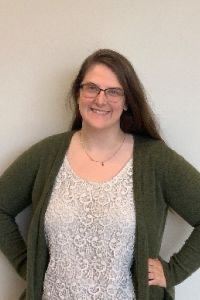 Why I chose Pitt: When looking to apply to programs, Pitt’s program stuck out to me by having students take most coursework in the first year of training and then having a focus on clinicals during the second year. Hearing more about this program design, I knew that this confidence building model was a great fit for my learning style. With Pitt being housed in the Graduate School of Public Health, classes are taken with students pursuing different degrees. I felt it was important for my education to be in a program that promotes collaboration between a variety of disciplines. During my interview, it was apparent that the program leadership fostered a welcoming and supportive environment to help students become well-rounded genetic counselors. I am excited to start my graduate education and be a part of Pitt’s GC program.
Why I chose Pitt: When looking to apply to programs, Pitt’s program stuck out to me by having students take most coursework in the first year of training and then having a focus on clinicals during the second year. Hearing more about this program design, I knew that this confidence building model was a great fit for my learning style. With Pitt being housed in the Graduate School of Public Health, classes are taken with students pursuing different degrees. I felt it was important for my education to be in a program that promotes collaboration between a variety of disciplines. During my interview, it was apparent that the program leadership fostered a welcoming and supportive environment to help students become well-rounded genetic counselors. I am excited to start my graduate education and be a part of Pitt’s GC program.
Background: Genetic counseling assistant (Cincinnati, OH); volunteer at Ronald McDonald House; cancer GC shadow (TriHealth, Cincinnati, OH); prenatal GC informational interview (Natera); pediatric GC informational interview (Nationwide Children’s)
Kristen D’Aquila (BS in secondary education and biology, University of Cincinnati, 2016)
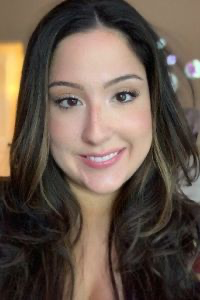 Why I chose Pitt: The Graduate School of Public Health is unique in that it offers an MPH in Public Health Genetics and MS in Genetic Counseling dual-degree program, providing graduates with the training to succeed as public health practitioners and genetic counselors. Given my interests in health disparities and inequities in genetics services, it became clear that Pitt was a great fit for me. I originally joined the department as an MPH student in 2018, and I am thrilled to continue my training as a dual-degree student. I am continuously motivated by the collaborative environment, opportunities for growth, and the faculty and students’ shared vision to improve the health of patients, families, and diverse communities.
Why I chose Pitt: The Graduate School of Public Health is unique in that it offers an MPH in Public Health Genetics and MS in Genetic Counseling dual-degree program, providing graduates with the training to succeed as public health practitioners and genetic counselors. Given my interests in health disparities and inequities in genetics services, it became clear that Pitt was a great fit for me. I originally joined the department as an MPH student in 2018, and I am thrilled to continue my training as a dual-degree student. I am continuously motivated by the collaborative environment, opportunities for growth, and the faculty and students’ shared vision to improve the health of patients, families, and diverse communities.
Background: Centers for Disease Control and Prevention intern (CDC Office of Genomics and Precision Public Health); research assistant (The University of Texas Health Science Center); Medical Reserve Corps (San Antonio Metropolitan Health District); Communities in Schools mentor; Planned Parenthood volunteer; genetic counseling shadowing (May’s Cancer Center, San Antonio)
Work Position: Genetic counseling graduate student worker at the UPMC Hereditary GI Tumor Program
Lauren Garcia (BA biology, St. Mary’s University, Certificate in Public Health, The University of Texas Health Science Center, 2018)
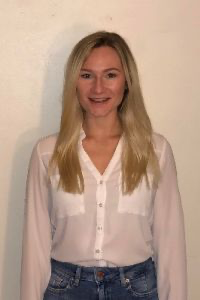 Why I chose Pitt: Pitt’s program has been on my radar since I first learned about genetic counseling in the 9th grade. As I learned more about the program in undergrad, and during my time living here after graduation, it only confirmed that Pitt was my top choice. The program provides access to not only amazing healthcare systems, but the opportunity to learn from equally amazing genetic counselors. During interviews, it was wonderful to hear how hands-on the program directors and surrounding genetic counselors and physicians are in the student’s learning. It was important to me to choose a program with supportive program leadership. I also loved that the program is not only housed in the School of Public Health but GC students have the opportunity to pursue a dual degree in Public Health Genetics. This is a unique advantage at Pitt’s program that I think provides a different perspective to the constantly changing field of genetic counseling. Outside of the program itself, what’s not to love about this beautiful city! The skylines are gorgeous, the people are friendly, and there’s never a shortage of things to do. Whether you enjoy trying one of the many breweries, taking a walk through local parks, or simply exploring the differences between the neighborhoods, Pittsburgh is truly a lovely place to live and I’m excited to get to be able to spend two more years here.
Why I chose Pitt: Pitt’s program has been on my radar since I first learned about genetic counseling in the 9th grade. As I learned more about the program in undergrad, and during my time living here after graduation, it only confirmed that Pitt was my top choice. The program provides access to not only amazing healthcare systems, but the opportunity to learn from equally amazing genetic counselors. During interviews, it was wonderful to hear how hands-on the program directors and surrounding genetic counselors and physicians are in the student’s learning. It was important to me to choose a program with supportive program leadership. I also loved that the program is not only housed in the School of Public Health but GC students have the opportunity to pursue a dual degree in Public Health Genetics. This is a unique advantage at Pitt’s program that I think provides a different perspective to the constantly changing field of genetic counseling. Outside of the program itself, what’s not to love about this beautiful city! The skylines are gorgeous, the people are friendly, and there’s never a shortage of things to do. Whether you enjoy trying one of the many breweries, taking a walk through local parks, or simply exploring the differences between the neighborhoods, Pittsburgh is truly a lovely place to live and I’m excited to get to be able to spend two more years here.
Background: Cognition trainer (Brain Train America); developmental intern (University of Maryland, NICU); domestic violence hotline volunteer (Crisis Center North); GC shadowing (Greater Washington Maternal Fetal Medicine and Genetics, UPMC Magee Women’s Hospital, UPMC Children’s Hospital of Pittsburgh, West Penn Hospital); genetic counselor assistant (Children’s Hospital of Pittsburgh)
Work Position: Genetic counselor assistant in the Division of Medical Genetics at UPMC Children’s Hospital of Pittsburgh
Julia Knapo (BA biology, minor in psychology, University of Maryland, Baltimore County, 2017)
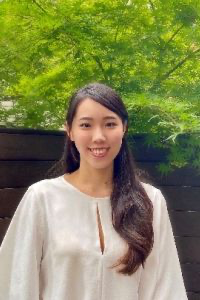 Why I chose Pitt: Pitt being the only school in the nation to offer a dual-degree program in Genetic Counseling and Public Health Genetics drew my attention when I was applying. During the interview process, I felt very welcomed by the faculty members and the GC students, and I especially felt their supportive spirit. The Pitt program is well established and I thought their confidence building model would fit my learning style very well. I really appreciate Pitt’s international scope and the opportunity to do clinical rotation internationally. The more I thought of my future goal, the more I saw the importance of public health approach in genetics. Pittsburgh is a very new environment for me, but I am excited to explore the city (after this pandemic) and become well-rounded GC as I receive the education from the Pitt Public Health Program.
Why I chose Pitt: Pitt being the only school in the nation to offer a dual-degree program in Genetic Counseling and Public Health Genetics drew my attention when I was applying. During the interview process, I felt very welcomed by the faculty members and the GC students, and I especially felt their supportive spirit. The Pitt program is well established and I thought their confidence building model would fit my learning style very well. I really appreciate Pitt’s international scope and the opportunity to do clinical rotation internationally. The more I thought of my future goal, the more I saw the importance of public health approach in genetics. Pittsburgh is a very new environment for me, but I am excited to explore the city (after this pandemic) and become well-rounded GC as I receive the education from the Pitt Public Health Program.
Background: Staff research associate I (UCLA David Geffen School of Medicine); genetic counseling shadowing (Cedars-Sinai Samuel Oschin Cancer Center; Kaiser Permanente West LA Medical Center; UCLA Obstetrics and Gynecology Clinical Genetics); suicide prevention crisis counselor (Didi Hirsch Mental Health Service); Genetic Counseling Student Interest Group (UCLA)
Work Position: Genetic counselor assistant at UPMC Shadyside GI Lab
Aika Miikeda (BS in microbiology, immunology, and molecular genetics, UCLA, 2018)
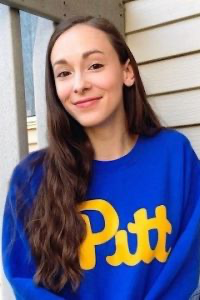 Why I chose Pitt: I chose Pitt because I have really come to respect the thriving medical community in Pittsburgh and the high standards of the genetic counseling program. As an undergraduate at Pitt, I had the opportunity to learn about the genetic counseling program in depth, as well as meet the program directors and current students. I knew through these experiences that I would get an invaluable education and make incredible connections with the students and faculty in the Public Health school. I have full confidence that the education, public health perspective, and clinical rotations in the area will help me become a thoughtful and well-rounded genetic counselor. I am truly a Panther for life and thrilled to be a part of the class of 2022.
Why I chose Pitt: I chose Pitt because I have really come to respect the thriving medical community in Pittsburgh and the high standards of the genetic counseling program. As an undergraduate at Pitt, I had the opportunity to learn about the genetic counseling program in depth, as well as meet the program directors and current students. I knew through these experiences that I would get an invaluable education and make incredible connections with the students and faculty in the Public Health school. I have full confidence that the education, public health perspective, and clinical rotations in the area will help me become a thoughtful and well-rounded genetic counselor. I am truly a Panther for life and thrilled to be a part of the class of 2022.
Background: Genetic counseling assistant (PreventionGenetics, Marshfield, WI); client services representative (Rhythm Pharmaceuticals, Marshfield, WI); Pittsburgh Action Against Rape helpline volunteer (Pittsburgh, PA); Foundations of Biology undergraduate teaching assistant (University of Pittsburgh); Pitt Genetic Counseling Club (University of Pittsburgh)
Work Position: Genetic Counseling Assistant, PreventionGenetics
Maria Rhine (BS in biological sciences, minors in chemistry and social work, certificate in conceptual foundations of medicine, University of Pittsburgh, 2019)
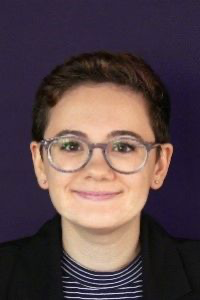 Why I chose Pitt: I had an initial bias towards Pitt as my top choice for a genetic counseling program because I love my undergrad career there so much, but everything else I learned about it made it seem like a true perfect fit. As a meticulous planner, the confidence building model of having the majority of classes before clinical rotations spoke to me. I was reassured by their friendliness towards students working part-time to support themselves through graduate school. The placement of the program within the School of Public Health shows how much they value how genetic counseling fits into the wider context of healthcare. And above all, I could tell how much the directors cared about developing excellent genetic counselors while providing support for their students. I knew that if I matched with Pitt, I would become part of a tight-knit, lifelong community.
Why I chose Pitt: I had an initial bias towards Pitt as my top choice for a genetic counseling program because I love my undergrad career there so much, but everything else I learned about it made it seem like a true perfect fit. As a meticulous planner, the confidence building model of having the majority of classes before clinical rotations spoke to me. I was reassured by their friendliness towards students working part-time to support themselves through graduate school. The placement of the program within the School of Public Health shows how much they value how genetic counseling fits into the wider context of healthcare. And above all, I could tell how much the directors cared about developing excellent genetic counselors while providing support for their students. I knew that if I matched with Pitt, I would become part of a tight-knit, lifelong community.
Background: Sexual assault crisis line volunteer (Pittsburgh Action Against Rape); research assistant in mtDNA lab (Vascular Medicine Institute, Pitt); programming and development intern (Our Clubhouse); vice president and editor-in-chief (Pitt Genetic Counseling Club); copy chief (The Pitt News); editor-in-chief (The Pitt Pulse)
Work Position: Genetic counseling program teaching assistant
Bailey Sasseville (BS biological sciences with minor in chemistry, BA English writing, University of Pittsburgh, 2020)
Why I chose Pitt: I chose Pitt because of the confidence-building model. I really like the idea of taking most of my classes in the first year and then building in shadowing and clinical work. I also like that all clinical rotations are located in Pittsburgh and a car is not required to attend clinics.
Background: Genetic counseling assistant (GeneDx); volunteer (The Down Syndrome Association of Northern Virginia)
Haley Soller (BS in biology, minor in anthropology, University of Virginia, 2019.)
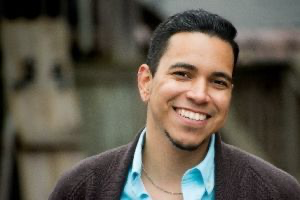 Why I chose Pitt: I chose Pitt because their GC program, along with the broader Human Genetics curriculum, is uniquely housed in the Graduate School of Public Health, which allows me to work collaboratively and intimately with other public health professionals. In this program, it is clear to me that even as we pursue separate goals as scientists, as clinicians, and as researchers, the work that we put in is for the shared goal of achieving population health for all. The curriculum also includes clinical rotations and plenty of roleplay: directors prepare students for their careers by showing, not telling. Faculty and staff know what they are doing, and they do it well. More than that, they include the students every step of the way. When students and faculty ask me, “How are you doing?” I can just tell that they mean it. Pitt is also just a lovely city to live in. I appreciate the city’s rugged terrain, abundance of beautiful green spaces (I’m looking at you, Frick Park), and I also recognize its burgeoning role as a healthcare leader in southwestern PA – clinical resources abound!
Why I chose Pitt: I chose Pitt because their GC program, along with the broader Human Genetics curriculum, is uniquely housed in the Graduate School of Public Health, which allows me to work collaboratively and intimately with other public health professionals. In this program, it is clear to me that even as we pursue separate goals as scientists, as clinicians, and as researchers, the work that we put in is for the shared goal of achieving population health for all. The curriculum also includes clinical rotations and plenty of roleplay: directors prepare students for their careers by showing, not telling. Faculty and staff know what they are doing, and they do it well. More than that, they include the students every step of the way. When students and faculty ask me, “How are you doing?” I can just tell that they mean it. Pitt is also just a lovely city to live in. I appreciate the city’s rugged terrain, abundance of beautiful green spaces (I’m looking at you, Frick Park), and I also recognize its burgeoning role as a healthcare leader in southwestern PA – clinical resources abound!
Background: Seasonal affective disorder undergraduate researcher (University of Pittsburgh); board of directors (Peer Support and Advocacy Network); hospital volunteer (UPMC Hillman Cancer Center, Magee-Womens Hospital); admin staff assistant (American Cancer Society); student intern (Bridging the Gaps, University of Pittsburgh); student intern (CDC Office of Genomics and Precision Public Health); HUGEN Curriculum Committee student representative (University of Pittsburgh)
Work Position: Graduate student research assistant with the Center for Craniofacial and Dental Genetics/COHRA2 Study
Frank Swann (BS psychology with honors, minor in French language, University of Pittsburgh, 2015)
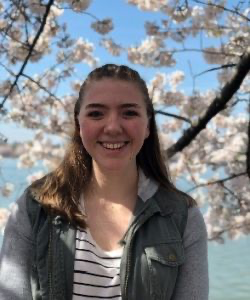 Why I chose Pitt: I was so excited to start my genetic counseling training at the University of Pittsburgh! Although I am not currently in the dual-degree program here, I really liked how Pitt integrated public health and community impact even among the standard genetic counseling classes. I think it is always important to be able to relay a lot of the clinical concepts and experiences back to larger communities and learn more about the correlations between public health sciences and genetic counseling. Coming originally from Minnesota, the city of Pittsburgh has been home to me for the past couple of years, and I was excited to learn more about the Pittsburgh community and finally become a part of the “yinzer culture.”
Why I chose Pitt: I was so excited to start my genetic counseling training at the University of Pittsburgh! Although I am not currently in the dual-degree program here, I really liked how Pitt integrated public health and community impact even among the standard genetic counseling classes. I think it is always important to be able to relay a lot of the clinical concepts and experiences back to larger communities and learn more about the correlations between public health sciences and genetic counseling. Coming originally from Minnesota, the city of Pittsburgh has been home to me for the past couple of years, and I was excited to learn more about the Pittsburgh community and finally become a part of the “yinzer culture.”
Background: Leadership intern (Willis L. Jones Leadership Center; University of Wisconsin-Madison); lead staff member (Porchlight Inc, Madison, WI); board member (Student Employee Advisory Group, University of Wisconsin- Madison); genetic counseling intern (Regions Hospital, Minnesota)
Work Position: Genetic counseling assistant at Allegheny Health Network’s Oncology Genetics Department; sexual assault counselor through PAAR; project manager for the Glimmer of Hope High Risk Breast Cancer Program
Natalie Tri (BS in genetics, minor in leadership, University of Wisconsin-Madison, 2018)